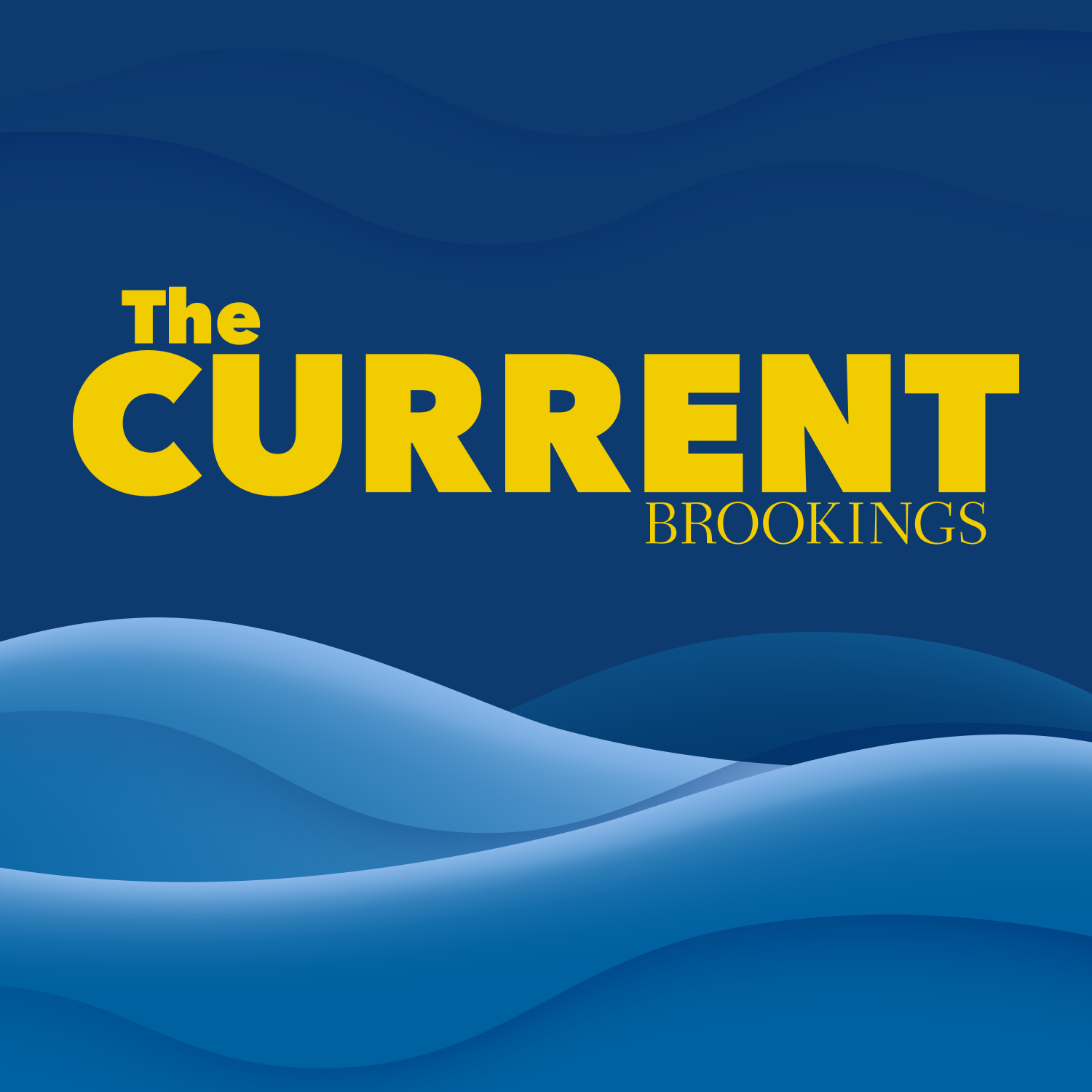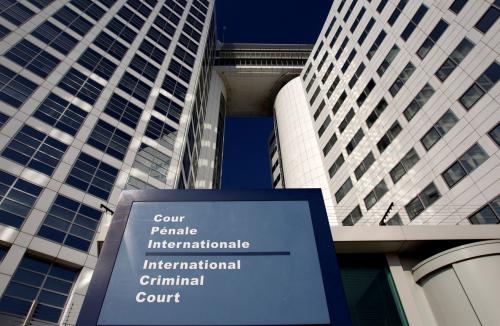... from a scholarly and purely analytical perspective, we lay out what works and what doesn’t work. And that’s pertinent to the moment in the United States.
Norm Eisen
Democracy Playbook 2025, published by the Anti-Corruption, Democracy, and Security project at Brookings, identifies seven pillars that are essential to safeguard democracy worldwide and offers actionable steps to strengthen democratic institutions in the U.S. and globally. To talk about the new report, Governance Studies Senior Fellow Norm Eisen, co-editor of the Playbook, joins The Current.
Transcript
[music]
DEWS: You’re listening to The Current, part of the Brookings Podcast Network, found online with our other public policy shows at Brookings .edu slash podcasts. We’re publishing new episodes of the Force at Africa podcast now, and other shows are returning soon. I’m Fred Dews.
In January, just before the inauguration of Donald Trump as 47th president of the United States, the Anti-Corruption, Democracy, and Security Project at Brookings released the third version of its Democracy Playbook, first published in 2019 and revised in 2021. The Democracy Playbook aims to quote, “help citizens and stakeholders reclaim good governance, transparency and the rule of law, and strengthen democratic resilience in the face of dangerous autocrats.”
With me now to talk about the updated Democracy Playbook is Norm Eisen, senior fellow in Governance Studies at Brookings and Chair of the Anti-Corruption, Democracy, and Security Project, ACDS for short. He is co-editor of the Democracy Playbook with Jonathan Katz.
Norm, welcome back to The Current.
EISEN: Thank you, Fred. Always great to be with you and the listeners of The Current, one of my favorite podcast visits, and I do quite a few of them.
DEWS: Yeah. I feel like every time I talk with you on this show, it’s about threats to the rule of law or government ethics violations or corruption in government.
[1:30]
EISEN: Well, Fred, you and I have talked over the years about the mounting evidence of autocratic onslaught in the United States. In fact, our Democracy Playbook that we published at Brookings, the third edition, just before the new administration took office, warned that the evidence was there of significant democratic backsliding in the United States. And I think we’ve seen that in the intervening weeks.
The good news is, and we’ll talk about this today, that the Democracy Playbook, now in its third edition, so we’ve been tracking this for many years, offers concrete solutions across a variety of areas that have worked to respond to autocracy in other countries. There’s a reason that Poland and Brazil, the Czech Republic, the massive Tel Aviv response to autocratic legislation in Israel, massive and successful in all those places, that those have been adequate response to democratic backsliding. And from a scholarly and purely analytical perspective, we lay out what works and what doesn’t work. And that’s pertinent to the moment in the United States.
DEWS: Well, Norm, I want to ask this question, though. I’m sure that you and your team are working on the revised edition of Democracy Playbook even before the 2024 presidential election. So if Kamala Harris had won that election, would you still have issued a revised Playbook when you did?
[3:10]
EISEN: Indeed, Fred, it’s 170 pages long, more than 700 footnotes, involved consultations with experts in the United States and around the world, including those who’ve done extensive fieldwork in those countries I talked about, as well as other countries where democratic backsliding took hold and was not reversed like Hungary and Turkey. It’s important to extract the lessons there.
So we had a long ramp, and the lessons are essential irrespective of the issues in the United States. This is a playbook for around the world.
I will say that we’ve done two prior editions before the current administration, long before the current administration. One was done to kick off the Biden administration. So these are lessons that you have to have no matter what.
DEWS: Norm, in the Playbook, you highlight seven pillars of democracy resilience. Can you just name them quickly and also address why these seven specifically?
[4:23]
EISEN: Fred, if I can take that in the opposite order, there’s a thousand and one things that you can do to fortify democratic resilience. And in our scholarship, but also in talking to the practitioners—we didn’t just do the scholarship and talk to leading anti-autocracy experts like Kim Scheppele at Princeton, Ruth Ben-Ghiat at New York University—but we talked to the people who’ve actually fought for democracy all over the world, in the United States, but also Poland, Brazil, Israel, Czech Republic was another important one. I did the fieldwork there myself. They had an autocratic regime, actually knew both of their autocratic leaders and, believe it or not, had friendly relations with them from the time when I was ambassador. But of course, I didn’t agree with their policies. And Hungary, Turkey.
[5:30]
We looked at autocracy in the United States. There’s states where actually we’ve seen democratic backsliding: Florida, Texas, Wisconsin. And in some of those places, in my view, the autocratic trends in Wisconsin were able to be arrested. It has not been as successful in Texas and Florida. There’s been some pushback.
Be that as it may, we surveyed that waterfront, and we discovered a thousand and one things you can do. Forget nine hundred ninety four, there’s seven essential ones that our scholarship establish, reversing democratic backsliding focuses on. This is why you had some countries and states where democratic backsliding was halted and others where it has not been corrected.
Number one, you must focus on the rule of law, because as we’re seeing now in the United States and with the court push back and the courts, judges, litigants are an important part of pushing back. And I’ll take as an example as well in the international setting, the ways in which the courts have been a bulwark in Brazil, where they have responded much more vigorously to the attempted coup there than the courts were able to respond in the United States to what happened here.
Then next, you have to protect elections, because that’s another way, the ultimate way, that autocratic regimes are ousted at the ballot box. Again, I’m just speaking as an analyst. I’m putting aside my other non-Brookings advocacy activities in all of these pillars.
Third, you must address corruption. Every autocratic regime has favored oligarchs, and we’ve seen that around the world. And so that’s another priority, rule of law and otherwise.
Fourth, you have to protect civic and media space. That’s why the think tank world, the press world—some have done anticipatory obedience, others, I was very proud that Brookings published this first scholarly assessment anywhere post-election that we were in a democratic backsliding situation in the United States, and that accurately analyzed what came after the election. So you have to defend civic and media space.
Pluralism. Very important. Every autocracy targets a scapegoat. And whether it’s migrants in the United States—I myself am the child of Holocaust survivors, so historically I’m not comparing anything that’s going on in autocratic regimes that I’ve named, including in the U.S., to what happened in the Holocaust, of course—but the scapegoating is a common theme. Migrants are often targeted. The other.
And then two final things: combating disinformation. That’s what we’re all about, of course, at Brookings and what the academy generally, scholarship, and explaining and analyzing. Democracy delivers, dictatorship doesn’t. And of course, there’s so much that Brookings does to explain good policy.
So those are the seven pillars where I think the focus needs to be. And I’m so, so proud to be part of an institution that that supports me in writing, analyzing, speaking and pointing out as a scholar the current state of affairs.
DEWS: And I wonder then, given those seven pillars, your views on achieving them in the context of our polarized politics. You observe in the Playbook that Republicans and Democrats both agree that democracy is under threat, but for very different reasons, namely the electoral success of the other party is what is the threat to democracy. Given this polarized political environment, how can you make progress on these pillars of democracy?
[9:42]
EISEN: Well, Fred, part of the solution is not to give into the polarization. And we write about that in the Playbook. And I think that, while I believe in the asymmetrical dysfunction that my former Brookings colleague and my teacher and mentor Tom Mann—for decades a stalwart of Brookings Governance Studies, welcomed me to the program, taught me how to do social science—while I believe in Tom Mann’s analysis of the current situation with my friend and also my mentor, Norm Ornstein—Norm and I call each other the ethical Norms and Norm the Elder and Norm the Younger—they were the first to analyze the asymmetry in the United States. That one of the major political parties has a much stronger tilt towards autocratic inclinations than the other.
But that being said, both parties at times, and certainly members of both parties at times have given in to the temptation to speak disinformation, to engage in unfounded personal invective, to push policies that may not be fully compliant. It’s asymmetrical. You almost can’t compare them. It’s apples and oranges. But it’s not unique to any part of the political spectrum. And we say so in the Democracy Playbook. And we say, please don’t give in to that temptation.
DEWS: Well, I want to also shout out to Tom Mann, Norm, because he hired me to come work with Brookings many, many years ago.
EISEN: What?!? Let’s send him this podcast. You know, he still listens, Fred. And he and Norm Ornstein really were my, when I decided to become a social scientist, if I dare use that name for somebody with a law degree, they taught me how to do serious social science. And I was resistant to their analysis of this asymmetry. And I fought them, but they eventually persuaded me. It was when I was in the White House. And I don’t think I’m speaking out of school to say that they had written a book, It’s worse than it looks or It’s worse than you think. And I walked that book into the Oval Office. That’s how seriously I took this threat of asymmetry. And of course, it’s since come to bear.
DEWS: Well, shout out to Tom Mann. And I’ll make sure that he gets a link to this podcast.
Norm, barely a month before the 2024 election, you appeared on another Brookings podcast, Democracy in Question, hosted by your fellow scholar, Katie Dunn Tenpas, and which has been greenlit for a season two coming soon. You were asked how nervous you were about the future of American democracy on a scale of 1 to 10, again, before the election. You rated your concern high at about an 8. Based on current events, has your score changed?
[13:06]
EISEN: Certainly everything I was anxious about has only intensified. But I at the same time, the shock and awe, flood the zone nature of autocratic activity in the United States over the past three weeks has been massive. But the democracy pushback, the shock and awe of the rule of law, the immune response of the body politic has been even more vigorous. And so my 8 was tempered, Fred, by the belief, the concern, that I didn’t know if democracy and the rule of law would withstand the assault. And they’ve not only withstood it, but we’re seeing things that in other countries, peaceful and lawful protests—it hasn’t been very much covered, but there have been people all over the country who have been protesting. The political class in Congress, which seemed a little dazed and uncertain initially, has been increasingly vocal and strategic. They’re coming up with plans.
So it seems to me that while the concern is great, we need to have another ranking for the response. But if I factor in the response, I would say I feel more confident than I did before the election. I knew we would get an autocratic surge. It just was so plain. I mean, it’s there … it was promised constantly. I didn’t know what the response would be. And I’m very encouraged by the early response.
DEWS: Well, that is encouraging. So it leads me to my final question, Norm. What is next for your research agenda and the ACDS Project’s research agenda for democracy protection and promotion?
[15:04]
EISEN: We have a research project that is lined up for one, at least one, for each of those seven pillars. We’re gonna be continuing to produce analysis on the cutting edge of the functioning of American rule of law, the importance of protecting our free, fair, and safe elections, the work we’ve been known for about anti-corruption issues and on and on.
Not just in the United States, Fred. We’re talking to experts around the world. We’re continuing our field work. We’re working on the fourth edition of the Playbook. And then on specific projects in each of these areas that just as the playbook has framed so much of the analysis and discussion, been downloaded countless times, quoted our chart of the seven pillars up on TV screens. We’re gonna continue to drive that analysis forward, strictly independently, calling out folks irrespective of ideology and meeting the strongest standards of quality independence and impact that we’re so proud to advance here at Brookings Governance Studies.
DEWS: Well, Norm, it’s always a fascinating conversation with you. This is very important work, so I thank you for your time and insights today.
EISEN: Thank you, Fred. Always a pleasure to be with you.
[music]
DEWS: You can read and download Democracy Playbook, co-edited by Norm Eisen and Jonathan Katz and published by the Anti-Corruption, Democracy, and Security Project, on our website, Brookings dot edu.
EISEN: Thanks, Fred.
The Brookings Institution is committed to quality, independence, and impact.
We are supported by a diverse array of funders. In line with our values and policies, each Brookings publication represents the sole views of its author(s).




Commentary
PodcastA playbook to counter democratic backsliding in the US and abroad
Listen on
The Current Podcast
February 13, 2025